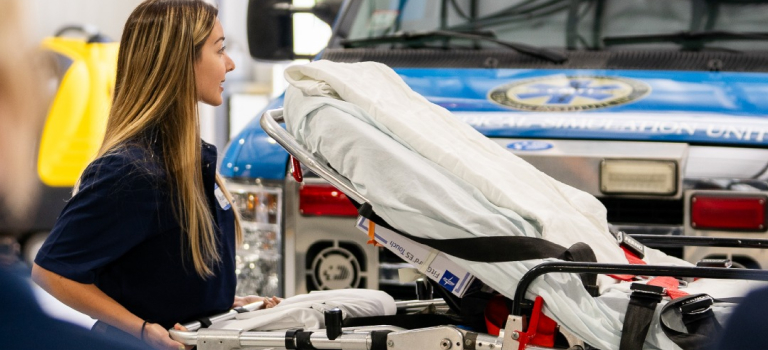Paramedic Education

Overview
The Paramedic Education Certificate Program offered in partnership with the Comprehensive Medical Teaching Institute (CMTI) at Quincy College will teach and prepare students to achieve the highest level of certification for emergency prehospital medical providers. The program lasts approximately 16 months over four semesters and includes 12 months of didactics, skills lab sessions, and skills scenario evaluations over the first three academic semesters.
Semesters two and three include a clinical internship with an assigned hospital preceptor where you will start to apply the knowledge and skills that you learned in a live patient setting. The fourth semester is a field internship where you will ride with an EMS unit with an experienced paramedic preceptor to further build upon the assessment, management, and treatment skills developed during your classroom and clinical experiences and apply them to the out-of-hospital setting as a provider and team leader. At the conclusion of the program, you must be able to demonstrate, through testing and evaluation, the competencies and skills required of the entry-level Paramedic.
Program Outcomes
At the completion of this program, the student should be able to:
- Understand their roles and responsibilities within an Emergency Medical System (EMS), and how those roles differ from other levels of providers.
- Take an appropriate medical history, and perform a comprehensive physical exam of any patient and communicate the findings to other health care professionals.
- Integrate pathophysiological principles and assessment findings to formulate field impression and implement the treatment plan for the trauma patient.
- Integrate pathophysiological principles and assessment findings to formulate a field impression and implement the treatment plan for the medical patient.
- Integrate pathophysiological principles and assessment findings to formulate a field impression and implement the treatment plan for neonatal, pediatric, and geriatric patients, diverse patients and chronologically ill patients.
- Integrate the pathophysiological principles and assessment findings to formulate a field impression and implement the treatment plan for patients with common complaints.
Academic Division of Professional Programs
Paramedic Education Courses
-
Code
Course
Credits
-
- EMS 201
Paramedic
- 7
-
- EMS 202
Paramedic 2
- 7
-
- EMS 203
Paramedic 3
- 7
-
- EMS 204
Paramedic 4
- 6
You might also be interested in...
-

Emergency Medical Technician (EMT)
Students learn medical and traumatic emergencies, childbirth, rescue extrication, ambulance operations, medical-legal implications, and AED/CPR.
-

Fire Science Technology
Designed for individuals interested in the fire service field and provides experienced firefighters with the opportunity to enhance their job skills.
-

Surgical Technology
The Surgical Technology Program is a two-year Associate of Science degree beginning in September each year.
-

Nursing (RN)
Quincy College’s Associate in Science Degree in Nursing program is a blended, Nurse of the Future competencies and concept-based curriculum.

